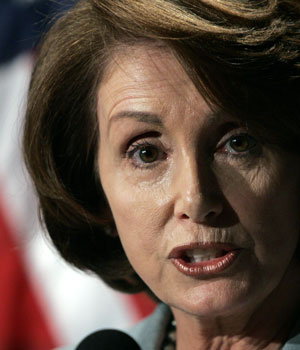
House Democratic Leader Nancy Pelosi, D-Calif., holds a news conference in reaction to President Bush’s Iraq speech on Capitol Hill in Washington Nov. 30, 2005 (AP)
WASHINGTON (AP) – Amid growing pressure to bring U.S. troops home from Iraq, President George W. Bush is refusing to set a timetable but indicating that by 2006, Iraqi forces will be sufficiently trained to let American troops shift to less visible and possibly less dangerous roles.
In a speech Wednesday at the U.S. Naval Academy at Annapolis, Maryland, Bush spelled out what he called his strategy for victory in Iraq, a plan that contained no new approaches and no start date for withdrawing U.S. troops. He urged patience, claimed steady progress and vowed to accept nothing less than "complete victory."
Democrats were quick to criticize, accusing Bush of failing to answer squarely the most pressing questions on the minds of Americans who wonder whether the cost in American blood and treasure has been worth it.
"If things on the ground in Iraq are as rosy as the picture the president painted today, then we should be able to begin to bring our troops home in 2006," said Sen. Edward Kennedy, a Massachusetts. "But, even according to the White House”s own document, we are a long way from victory."
Kennedy was referring to a White House report, titled "National Strategy for Victory in Iraq," that was released before Bush spoke as an outline of the administration”s rationale, strategy and measures of progress.
By next year, Bush said, U.S. commanders expect the Iraqi security forces to be able to assume more of the direct combat roles now performed by U.S. troops. "We will continue to shift from providing security and conducting operations against the enemy nationwide to conducting more specialized operations targeted at the most dangerous terrorists," Bush said. "We will increasingly move out of Iraqi cities, reduce the number of bases from which we operate and conduct fewer patrols and convoys."
The implication is that fewer U.S. troops will be needed, at least for missions that have been causing the bulk of U.S. casualties. So far, more than 2,100 American troops have died in Iraq.
In noting that U.S. forces have begun turning over control of military bases to the Iraqis, Bush singled out the Nov. 22 handover of a base near Tikrit that includes one of Saddam Hussein”s former palace complexes. Bush said it had served as a U.S. military headquarters "in one of Iraq”s most dangerous regions."
Bush”s definition of victory in Iraq suggested years of additional .S. military assistance. But it also may have set the stage for what Pentagon officials already have said is an expected 2006 drawdown of U.S. forces, which now total nearly 160,000. Bush emphasized recent progress in the training of Iraqi security forces, noting that they now control several sections of Iraq, including large portions of Baghdad.
"Victory will come when the terrorists and Saddamists can no longer threaten Iraq”s democracy, when the Iraqi security forces can provide for the safety of their own citizens, and when Iraq is not a safe haven for terrorists to plot new attacks on our nation," he said.
It”s not clear that terrorists have used Iraq as a haven to plot attacks on the United States, but Bush”s remark suggested a link between terrorists now in Iraq and those who planned the 2001 suicide hijack attacks. The two "share the same ideology," Bush said, of seeking to "sow anger and hatred and despair."
While stoutly defending his war strategy, Bush also acknowledged some setbacks and cautioned that the months ahead would be difficult. He noted that the Iraqi security force originally created to fight the insurgents "proved to be no match" for the enemy, and that some early training for Iraqi police was inadequate.
"Their performance is still uneven in some areas," Bush said, referring generally to Iraqi security forces.
Bush”s speech was the first in a series of planned presidential addresses aimed at shoring up public support for a war that has lasted much longer and caused more U.S. casualties than the administration originally expected.
"Our goal is to train enough Iraqi forces so they can carry the fight," Bush said. "And this will take time and patience."
Sen. Patrick Leahy, a Vermont Democrat, called Bush”s remarks "nothing more than a spruced up version of more of the same, riddled with feel-good rhetoric that bears little relationship to the facts facing our troops." He questioned why the White House waited until now, more than 2½ years into the war, to lay out publicly its strategy for victory.
House Minority Leader Nancy Pelosi, a California Democrat, embraced a call by a prominent defense hawk in her party to begin a troop withdrawal. Two weeks ago, Rep. John Murtha, a Pennsylvania Democrat, set off a political firestorm when he said a complete pullout should be achieved in six months. "The status quo is not working," Pelosi said.

U.S. President George W. Bush speaks about the war in Iraq at the United States Naval Academy in Annapolis, November 30, 2005 (REUTERS)

U.S. President George W. Bush waves to midshipmen after speaking about the war in Iraq at the United States Naval Academy in Annapolis, Maryland, November 30, 2005 (REUTERS)
